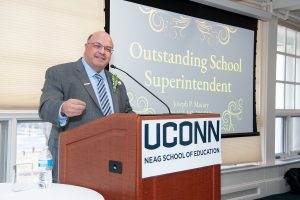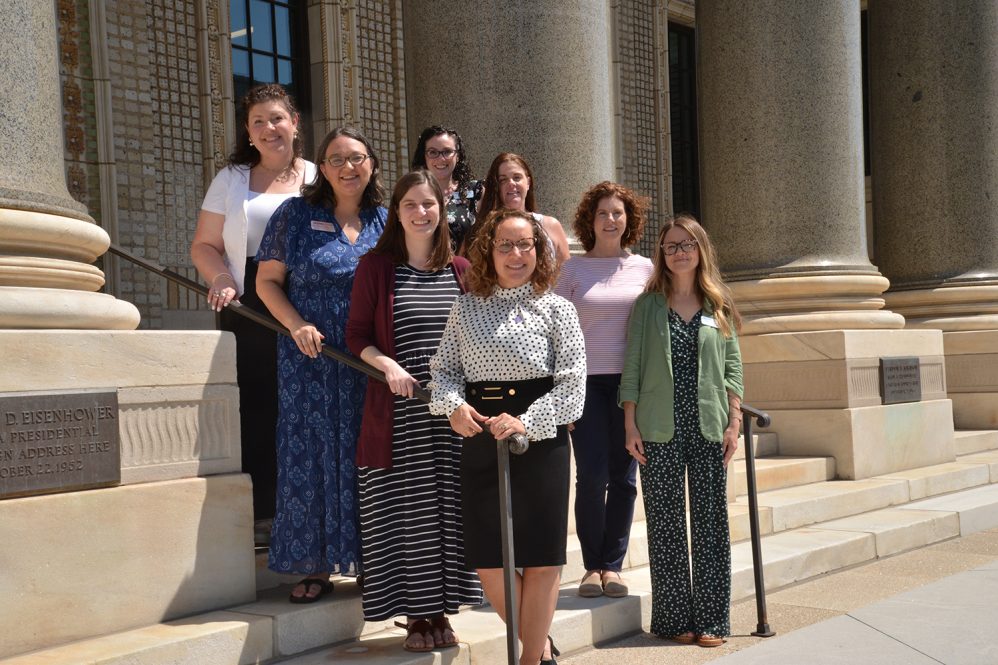The Neag School of Education’s Teacher Certification Program for College Graduates (TCPCG) has implemented significant changes over the past year aimed at better accommodating the needs of students and school district partners. The main shift was the program’s length, which decreased from 11 months to 10 months beginning with the summer 2024 cohort.
The decision to start the full-time program in mid-June proved beneficial in multiple ways. Under the previous structure, students who already worked in schools and wanted to pursue teacher certification had to leave their jobs before the end of the school year, which posed a challenge for them and their districts.
“This new timeline was chosen after a careful review of district calendars across the state,” says Tracy Sinclair, director of TCPCG. “By delaying the start, candidates working as paraprofessionals or long-term substitutes no longer had to quit their jobs early, helping school districts retain essential staff during the critical end-of-school period in June.”
Sinclair notes this change has also led to a demographic shift in the program’s enrollment. While there are still non-traditional students making mid-career transitions into teaching, many program participants are now recent college graduates.
“The 10-month program design allows these graduates a brief break between completing their undergraduate studies and starting the intensive graduate program,” she says. “Previously, students had only a few days between their undergraduate graduation and the start of TCPCG, which left little room for adjustment.”
Instead of offering two six-week summer semesters, the new program structure consolidates coursework into one 10-week summer semester. This allows students to spend more time on fewer courses, enabling a deeper understanding of critical pedagogical concepts. Sinclair explains that this shift from “a mile wide and an inch deep” to more focused, longer courses has improved the overall quality of the education students receive.
This condensed timeline allows me to balance family responsibilities while pursuing my teaching career and minimizing time away from my children. — Kamie Merithew, current student
Despite these changes, Sinclair acknowledges that the program remains rigorous. Students still take five graduate courses over 10 weeks in the summer, which can be challenging. However, the new structure includes shorter class days and built-in time for school-based clinical experiences, giving students more flexibility.
Ultimately, the shift to a 10-month program has positively impacted enrollment. Sinclair reports a 57% increase in enrollment across all four regional campuses that offer the program, which she attributes to a combination of effective marketing and the appeal of the redesigned structure. This growth is a promising sign for the program’s future as it continues to adapt to meet the needs of aspiring teachers and the Neag School’s partner schools.
“This condensed timeline allows me to balance family responsibilities while pursuing my teaching career and minimizing time away from my children,” says Kamie Merithew, a current TCPCG student. “As an adult transitioning careers later in life, I can quickly leverage my valuable life experiences and transferable skills in the classroom. The shorter program also reduces tuition costs and living expenses and enables me to gain practical experience to start teaching sooner.”

Another change to TCPCG, initially launched in 2021 with just a handful of districts, is its residency program offering students a half-year paid experience in participating school districts. These residencies allow students to spend two days in their specific content area and three days as a building substitute, providing them with valuable hands-on experience. At first, the program was small, but as demand grew the number of participating schools expanded rapidly. Now, TCPCG has partnered with over 20 schools across Connecticut.
In 2022-2023, a significant milestone was achieved when a district offered a full-year residency.
“Now, all of UConn’s regional campuses have at least one district offering a full-year residency, giving students a unique opportunity to gain sustained experience while alleviating some of the financial pressures associated with a graduate education,” Sinclair says.
One of the main benefits of this program is that it allows students to gain professional experience while also earning a salary. Sinclair emphasizes that “this blend of earning while learning helps ease the financial burden while still preparing students for a career in teaching.”
“From the perspective of school districts, the benefits are twofold,” she says. “Not only do they receive an additional staff member in the form of a building substitute during critical times, such as the lead-up to the holiday season, but they also gain the advantage of having a potential future employee immersed in their school environment for an entire year.
“This full-year engagement serves as a yearlong interview, allowing schools to evaluate the residents in real-world scenarios,” Sinclair says. “For students, this integration into a school community can foster deeper connections and increase their chances of securing employment post-graduation.”
“I think it’s great that the TCPCG program has a residency program in various school districts,” says Thomas Murray, a current student. “I know a lot of students in my cohort were ecstatic to hear that they will be getting paid for classroom observations. It gives us the opportunity to be at our placement every day and become more comfortable with the students and building.”

A recent TCPCG alumnus agrees.
“In addition to the financial benefits of being able to work while attending school, I was able to both work in the education field and at the school – and with the classes – where I would ultimately be doing my student teaching,” says Will Kampfman ’24 MA, a Hartford Public Schools social studies teacher. “My experience through the residency program was invaluable in preparing me for my student teaching experience in the spring, as it allowed me to start working with my cooperating teacher, to gain experience at my placement school, and to begin building positive rapport with my students.”
Vernon Public Schools is enthusiastic about partnering with TCPCG, specifically developing future teachers through the residency model.
“This collaboration builds on a longstanding relationship between Vernon schools and UConn, with many of the district’s most successful teachers being UConn graduates,” Superintendent Joseph Macary ’94 (CLAS), ’05 ELP, ’16 Ed.D. says. “Vernon has actively recruited UConn graduates for over a decade, and we have found great success in retaining these teachers, with very few leaving unless for personal reasons like moving.
“The new residency program is particularly promising. Currently, seven aspiring teachers are placed across Vernon schools, where they are already making an impact,” Macary says. “One principal expressed interest in hiring these residents next year due to their impressive performance. The program allows the district to evaluate whether these residents truly want to pursue teaching before fully committing to the profession.”
The district views the program as a solution to a national problem: the shortage of teachers. Fewer people were entering the profession even before the pandemic, and COVID-19 worsened the situation. Vernon has struggled to maintain a full staff of teachers, so building a pipeline through TCPCG’s residency program is crucial. Macary hopes many of these future educators will choose to stay in Vernon.
These program changes – the new residency component that benefits both TCPCG students and the program’s partner districts, and the shortened program length – ensure that UConn’s Teacher Certification Program for College Graduates continues to be an integral part of Connecticut’s educational landscape. The program prioritizes meeting the needs of the state’s public schools and those of future educators.
To learn more about the Teacher Certification Program for College Graduates, visit s.uconn.edu/teach.



